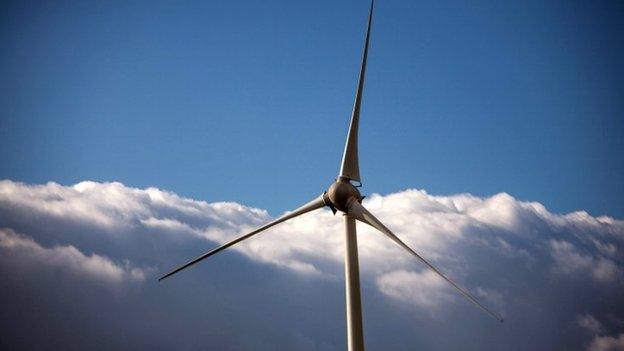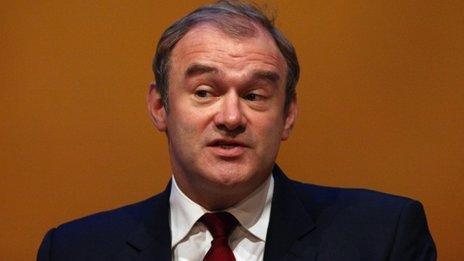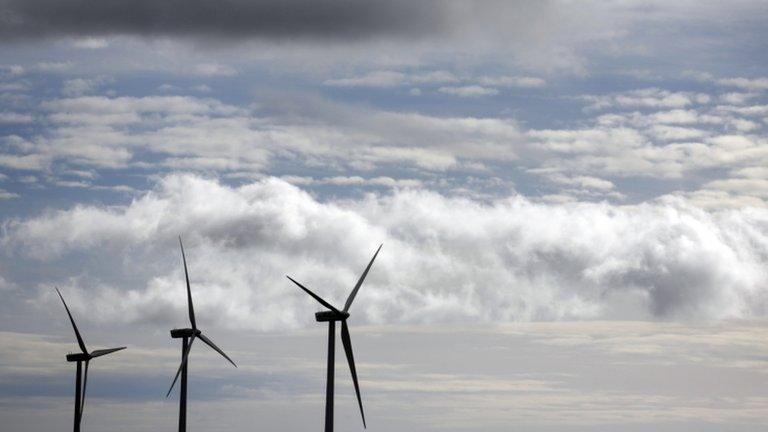Scottish independence: Complex energy choices, and in whose interests?
- Published

The emphasis of both UK and Scottish energy policy has been on developing wind and marine power
You could view the independence debate as a binary, static choice; "Yes" or "No"? But it's worth remembering that it takes place amidst immense change.
Forgive me if this seems a bit obvious. It's simply to point out that there are numerous dynamic elements which make the choice of constitutional future all the more complex.
For instance, there's a risk that Scotland could be out of the European Union if there's a "Yes" vote. But there's also a risk that Scotland could be taken out of the European Union if there's a "No" vote, because there could soon be a UK-wide referendum. And some say the risk is in NOT leaving the EU.
There's even more dynamics in energy markets. This is a time of huge change, with international obligations to cut the burning of fossil fuels and raising the element of renewables energy. Scotland and the UK are signed up for that.
And to make it happen, there is the prospect of a Europe-wide market being developed, if enough inter-connectors are put in place to transmit power over long distances.
Part of the dynamic behind that - and even moreso as it applies to gas supplies - is the sudden rise in the priority of energy security, and notably reducing dependence on Russian gas. So there are dynamics, and by their nature, dynamics themselves change.

UK Energy Secretary Ed Davey alluded to the fact that the price of solar energy has been plummeting
That's the context for the paper from the Department for Energy and Climate Change, set out on Wednesday.
It was published in the context of the UK government growing colder in its commitment to renewable power.
Without clear backing, big energy companies are withdrawing from wind array plan off the west of Scotland and elsewhere, as well as wave and tidal developments. The system of subsidies and minimum prices is not delivering what was hoped for.
Further background to the Whitehall analysis is that the UK government has been claiming the cost of renewable power is going to fall, or at least that bills would be lower than they might otherwise have been.
That's a difficult message to reconcile with the threat of significantly higher bills if Scotland were to be independent.
The context is also that the UK government has signed up to a colossally large commitment to new nuclear power.
According to some academic analysis, it's so expensive to develop Hinkley Point and stations to follow, and later to decommission them, that bills could actually fall in Scotland if it were independent and weren't saddled with its share of the cost of servicing that nuclear obligation.
Most other pressures on bills are upwards, in or out of the UK, so the possibility of a hike related to independence again needs to be seen in that light too.
Solar flare
There's further background to the renewables debate, which I've noted before, but which is becoming clearer. The emphasis of both UK and Scottish energy policy has been on developing wind and marine power.
But in the background, the price of solar has been plummeting. Ed Davey, the energy secretary, alluded to that when he took questions after his Edinburgh speech on Wednesday.
He was trying to make the point that a government representing England and Wales, but not Scotland, would not give Scottish renewable power any preference. He said it could choose, on commercial grounds, to buy green power from closer to home, extending to options across the English Channel and North Sea.
He went on to say that he had been in discussion with Citi Group analysts recently, who suggested to him that the price of solar energy could be heading into the same pricing patterns as computing power, with the unit costs falling exponentially.
A study by McKinsey reckons that the price of solar power per unit produced is falling by nearly three-quarters this decade. And that's not happening with offshore wind.
This was to illustrate a point about options if Scotland were to leave the UK. If it turns out to be correct, it has the potential to torpedo a great deal of the UK's and Scotland's energy strategy, and Scotland's industrial strategy as well, while giving respite to those bill-payers.
It is sometimes assumed that Scotland's climate is no place for solar power. That's wrong. But it's more efficient to harness it where the sun is strongest.
So with lots more of those European inter-connectors, the best place to source green energy could be from countries around the Mediterranean.
Interests or favours?
And here's one further point about the DECC analysis of energy and Scottish independence. It's a more political one.
We were told that the UK government would not negotiate ahead of the 18 September referendum.
One reason is that setting out any negotiating position risked sounding hostile to Scots, at a time when the plan has been to win Scottish voters over.
But now, the language of self-interest is becoming ever clearer. That was the justification for the Tory, Labour and Lib Dem ruling out of a currency union. Backed up by the top Treasury mandarin, the view was that it's not in the interests of England, Wales and Northern Ireland.
Now, we have an energy paper making that negotiating stance even more explicit. Ed Davey was setting out his thinking if he were to find himself representing only England, Wales and Northern Ireland.
The message was that Scotland could expect no favours, and no preferential treatment. However integrated now, he indicated that a Britain-wide energy market would be less important than developing the European dimension to that market.
Perhaps this shouldn't surprise us. The reality of politics is that politicians represent the electorates that pick them. The Scottish National Party is very clear that it seeks to speak for Scottish interests.
But now, we're hearing the voice of England, with some elements of Wales and Northern Ireland in there too, casting forward to a new possibility that there's no need to consider the Scottish interest.
It represents the pushback that could be expected if Scottish ministers set out their demands and intentions following a "Yes" vote.
Rather than being told what England's interests would be by Scottish ministers, England's interests are being articulated by English people.
In doing that, the UK government is conceding ground to nationalists. But it also places question marks over the optimistic view of independence negotiations to be found in the Scottish government's white paper.
- Published9 April 2014
